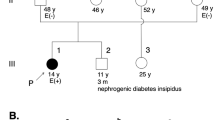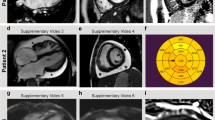Abstract
Hypertrophic and dilated cardiomyopathy (HCM, DCM) are leading causes of cardiovascular morbidity and mortality in children. The pseudokinase alpha-protein kinase 3 (ALPK3) plays an essential role in sarcomere organization and cardiomyocyte differentiation. ALPK3 coding mutations are causative of recessively inherited pediatric-onset DCM and HCM with variable expression of facial dysmorphism and skeletal abnormalities and implicated in dominantly inherited adult-onset cardiomyopathy. We now report two variants in ALPK3—a coding variant and a novel intronic variant affecting splicing. We demonstrate that compound heterozygosity for both variants is highly suggestive to be causative of infantile-onset HCM with webbed neck, and heterozygosity for the coding variant presents with adult-onset HCM. Our data validate partial penetrance of heterozygous loss-of-function ALPK3 mutations in late-onset hypertrophic cardiomyopathy and expand the genotypic spectrum of autosomal recessive ALPK3-related cardiac disease with Noonan-like features.
Graphical Abstract




Similar content being viewed by others
Data Availability
Data supporting the findings of this study, including the WES raw data, are available from the corresponding author (O.S.B) upon request.
References
Ciarambino T, Menna G, Sansone G, Giordano M. Cardiomyopathies: an overview. Int J Mol Sci. 2021. https://doi.org/10.3390/ijms22147722. (MDPI)
Maron BJ, Maron MS. Hypertrophic cardiomyopathy. Lancet. 2013. https://doi.org/10.1016/S0140-6736(12)60397-3. (Elsevier B.V)
Weintraub RG, Semsarian C, Macdonald P. Dilated cardiomyopathy. Lancet. 2017. https://doi.org/10.1016/S0140-6736(16)31713-5. (Lancet Publishing Group)
Wilkinson JD, Landy DC, Colan SD, Towbin JA, Sleeper LA, Orav EJ, Lipshultz SE. The pediatric cardiomyopathy registry and heart failure: key results from the first 15 years. Heart Fail Clin. 2010. https://doi.org/10.1016/j.hfc.2010.05.002.
Harmon WG, Sleeper LA, Cuniberti L, Messere J, Colan SD, Orav EJ, Lipshultz SE. treating children with idiopathic dilated cardiomyopathy (from the Pediatric Cardiomyopathy Registry). Am J Cardiol. 2009;104(2):281–6. https://doi.org/10.1016/j.amjcard.2009.03.033.
Lee TM, Hsu DT, Kantor P, Towbin JA, Ware SM, Colan SD, Lipshultz SE. Pediatric cardiomyopathies. Circ Res. 2017;121(7):855–73. https://doi.org/10.1161/CIRCRESAHA.116.309386.
Tariq M. Importance of genetic evaluation and testing in pediatric cardiomyopathy. World J Cardiol. 2014;6(11):1156. https://doi.org/10.4330/wjc.v6.i11.1156.
Towbin JA. Inherited cardiomyopathies. Circ J. 2014;78(10):2347–56. https://www.ncbi.nlm.nih.gov/pmc/articles/PMC4467885
Van Sligtenhorst I, Ding ZM, Shi ZZ, Read RW, Hansen G, Vogel P. Cardiomyopathy in α-kinase 3 (Alpk3)-deficient mice. Vet Pathol. 2012;49(1):131–41. https://doi.org/10.1177/0300985811402841.
Herkert JC, Verhagen JMA, Yotti R, Haghighi A, Phelan DG, James PA, van de Laar IMBH. Expanding the clinical and genetic spectrum of ALPK3 variants: phenotypes identified in pediatric cardiomyopathy patients and adults with heterozygous variants. Am Heart J. 2020;225:108–19. https://doi.org/10.1016/j.ahj.2020.03.023.
Almomani R, Verhagen JMA, Herkert JC, Brosens E, Van Spaendonck-Zwarts KY, Asimaki A, Van De Laar IMBH. Biallelic truncating mutations in ALPK3 cause severe pediatric cardiomyopathy. J Am Coll Cardiol. 2016;67(5):515–25. https://doi.org/10.1016/j.jacc.2015.10.093.
Çağlayan AO, Sezer RG, Kaymakçalan H, Ulgen E, Yavuz T, Baranoski JF, Gunel M. ALPK3 gene mutation in a patient with congenital cardiomyopathy and dysmorphic features. Cold Spring Harb Mol Case Stud. 2017;3(5). https://doi.org/10.1101/mcs.a001859.
Jaouadi H, Kraoua L, Chaker L, Atkinson A, Delague V, Levy N, Zaffran S. Novel ALPK3 mutation in a Tunisian patient with pediatric cardiomyopathy and facio-thoraco-skeletal features. J Hum Genet. 2018;63(10):1077–82. https://doi.org/10.1038/s10038-018-0492-1.
Al Senaidi K, Joshi N, Al-Nabhani M, Al-Kasbi G, Al Farqani A, Al-Thihli K, Al-Maawali A. Phenotypic spectrum of ALPK3-related cardiomyopathy. Am J Med Genet A. 2019;179(7):1235–40. https://doi.org/10.1002/ajmg.a.61176.
Lopes LR, Garcia-Hernández S, Lorenzini M, Futema M, Chumakova O, Zateyshchikov D, Elliott PM. Alpha-protein kinase 3 (ALPK3) truncating variants are a cause of autosomal dominant hypertrophic cardiomyopathy. Eur Heart J. 2021;42(32):3063–73. https://doi.org/10.1093/eurheartj/ehab424.
Li L, Bainbridge MN, Tan Y, Willerson JT, Marian AJ. A potential oligogenic etiology of hypertrophic cardiomyopathy: a classic single-gene disorder. Circ Res. 2017;120(7):1084–90. https://doi.org/10.1161/CIRCRESAHA.116.310559.
Agarwal R, Wakimoto H, Paulo JA, Zhang Q, Reichart D, Toepfer C, Seidman CE. Pathogenesis of cardiomyopathy caused by variants in ALPK3, an essential pseudokinase in the cardiomyocyte nucleus and sarcomere. Circulation. 2022. https://doi.org/10.1161/circulationaha.122.059688.
Funding
The study was funded by the Morris Kahn Family Foundation, the Israel Science Foundation (grant no. 2034/18) awarded to OSB, and the National Knowledge Center for Rare/Orphan Diseases sponsored by the Israel Ministry of Science, Technology and Space, at Ben-Gurion University of the Negev and Soroka Medical Center, Beer Sheva, Israel.
Author information
Authors and Affiliations
Contributions
YK, MH, MES, and OSB initiated the studies. TP designed molecular experiments; data analyzed by TP, MES, and OSB. TP, RPO, IA, VD, NA, MJ, AS, and OF performed the molecular experiments. RW, MH, YK, AL, and MES performed clinical phenotyping. TP drafted the manuscript with MES and OSB, revised and approved by all authors.
Corresponding author
Ethics declarations
Ethics Approval
The participants of this study provided written informed consent according to a protocol approved by the Soroka Medical Center institutional review board (ID5071G) and by the Israel National Committee for Human Genetic Studies, in adherence with the Helsinki principles.
Competing Interests
The authors declare no competing interests.
Additional information
Associate Editor Rody Walsh oversaw the review of this article
Publisher's Note
Springer Nature remains neutral with regard to jurisdictional claims in published maps and institutional affiliations.
Rights and permissions
Springer Nature or its licensor (e.g. a society or other partner) holds exclusive rights to this article under a publishing agreement with the author(s) or other rightsholder(s); author self-archiving of the accepted manuscript version of this article is solely governed by the terms of such publishing agreement and applicable law.
About this article
Cite this article
Poleg, T., Eskin-Schwartz, M., Proskorovski-Ohayon, R. et al. Compound Heterozygosity for Late-Onset Cardiomyopathy-Causative ALPK3 Coding Variant and Novel Intronic Variant Cause Infantile Hypertrophic Cardiomyopathy. J. of Cardiovasc. Trans. Res. 16, 1325–1331 (2023). https://doi.org/10.1007/s12265-023-10461-y
Received:
Accepted:
Published:
Issue Date:
DOI: https://doi.org/10.1007/s12265-023-10461-y




